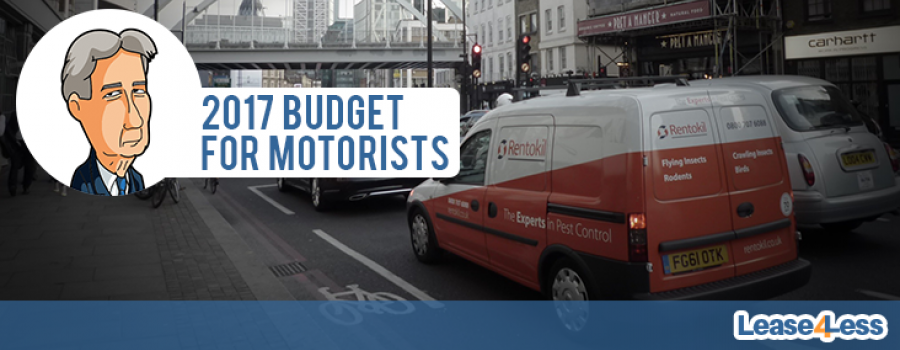
Budget 2017: Everything motorists need to know

Chancellor of the Exchequer Philip Hammond delivered his first Budget speech, here’s everything motorists need to know about the 2017 budget.
Budget 2017 For Motorists: What’s Changing?
This budget has been referred to as a “transitional budget” by Mr Hammond, this budget comes just just four months after the Autumn Statement. No dramatic announcements were made, but there are quite a few changes for motorists regarding company car tax, diesel vehicles, corporation tax and more.
Below are bullet points of the main changes proposed in the 2017 Budget.
- Company car tax: In 2017/18 the minimum company car benefit-in-kind tax charge will be 9% (0-50g/km) rising to 37% (190g/km+).
- Car salary sacrifice schemes and cash or car allowances: New rules governing car salary sacrifice schemes and cash or car allowances come into effect on April 6, 2017, as announced in the 2016 Autumn Statement, but the Budget failed to provide clarity on the specifics.
- Air quality and diesel vehicles: The government has served notice that the “tax treatment for diesel vehicles” could change as it seeks to cut pollution from the transport sector and improve air quality.
- Vehicle Excise Duty: Vehicle Excise Duty (VED), as announced in the post-2015 general election Summer Budget, is being reformed from April 1.
- Car fuel benefit charge 2017/18: Employees who are in receipt of company-funded fuel used privately will see their benefit-in-kind tax bills rise from April 6, 2017.
- Fuel Duty: Fuel Duty will be frozen again in 2017, the seventh consecutive year that there has been no increase.
- Driverless car technology: The 2017 Budget included an announcement regarding the investment of £270 million into innovative technology in the car industry.
Budget 2017: Company Car Tax
Over the next two years the minimum company car benefit-in-kind tax charge will be 9% for vehicles that emit 0-50g/km, then rising to 37% for vehicles that emit 190g/km +.
The 2017 Budget confirmed that the government would reshape company car benefit-in-kind tax from April 2020, this was proposed in the Autumn Statement in 2016 and is set to provide stronger incentives for fleets and employees that choose to use ultra-low emission vehicles as company cars.
The mileage range element will also be introduced in 2020/21, this is applicable to zero emission vehicles and ultra-low emission cars that use an electric battery, the table below shows company car benefit-in-kind tax rates.
For vehicle’s that use internal combustion engines and plug-in vehicles with emissions above 50h/km of CO2, the rate will change in 2020/21; vehicles that emit 51-54g/km of CO2 will start at 15%, rising to 37% for vehicle that emit 160g/km +.
Company car tax 2017/18 to 2020/21
| % of P11D | 2017/18 | 2018/19 | 2019/20 | 2020/21 |
| Price | CO2 (g/km) | CO2 (g/km) | CO2 (g/km) | CO2 (g/km)/electric mileage range |
| 0 | N/A | N/A | N/A | |
| 2 | N/A | N/A | N/A | 0-50 (zero emission or 130 miles+) |
| 5 | N/A | N/A | N/A | 1-50 (70-129 miles) |
| 7 | N/A | N/A | N/A | N/A |
| 8 | N/A | N/A | N/A | 1-50 (40-69 miles) |
| 9 | 0-50 | N/A | N/A | N/A |
| 10 | N/A | N/A | N/A | N/A |
| 11 | N/A | N/A | N/A | N/A |
| 12 | N/A | N/A | N/A | 1-50 (30-39 miles) |
| 13 | 51-75 | 0-50 | N/A | N/A |
| 14 | N/A | N/A | N/A | 1-50 (under 30 miles) |
| 15 | N/A | N/A | N/A | 51-54 |
| 16 | N/A | 51-75 | 0-50 | 55-59 |
| 17 | 76-94 | N/A | N/A | 60-64 |
| 18 | 95-99 | N/A | N/A | 65-69 |
| 19 | 100-104 | 76-94 | 51-75 | 70-74 |
| 20 | 105-109 | 95-99 | N/A | 75-79 |
| 21 | 110-114 | 100-104 | N/A | 80-84 |
| 22 | 115-119 | 105-109 | 76-94 | 85-89 |
| 23 | 120-124 | 110-114 | 95-99 | 90-94 |
| 24 | 125-129 | 115-119 | 100-104 | 95-99 |
| 25 | 130-134 | 120-124 | 105-109 | 100-104 |
| 26 | 135-139 | 125-129 | 110-114 | 105-109 |
| 27 | 140-144 | 130-134 | 115-119 | 110-114 |
| 28 | 145-149 | 135-139 | 120-124 | 115-119 |
| 29 | 150-154 | 140-144 | 125-129 | 120-124 |
| 30 | 155-159 | 145-149 | 130-134 | 125-129 |
| 31 | 160-164 | 150-154 | 135-139 | 130-134 |
| 32 | 165-169 | 155-159 | 140-144 | 135-139 |
| 33 | 170-174 | 160-164 | 145-149 | 140-144 |
| 34 | 175-179 | 165-169 | 150-154 | 145-149 |
| 35 | 180-184 | 170-174 | 155-159 | 150-154 |
| 36 | 185-189 | 175-179 | 160-164 | 155-159 |
| 37 | 190+ | 180+ | 165+ | 160+ |
Each tax year adds 3% for diesel cars up to a maximum of 37% until April 2021. Table via Newspress
Budget 2017: Car salary sacrifice schemes and car allowances
The 2017 Budget brings new rules in terms of car salary sacrifice schemes and cash or car allowances. These changes come into effect on April 6, 2017, these changes were originally proposed in the 2016 Autumn Statement but the Budget failed to provide further clarity and specific details.
Last year, the government published a policy paper on income tax. The paper outlined changes on limitations of salary sacrifice, since then there have been meetings with tax experts to discuss the impact of the proposed changes.
The final result of this is that further clarification will be published with the Budget papers, although this didn’t happen, so a separate HM Treasury announcement will be made which will confirm the new rules.
Budget 2017: Pollution & Diesel Vehicles
The government is aiming to improve air quality, a notice has been served stating that “tax treatment for diesel vehicles” could change.
A detailed draft plan will be reviewed by the government and new plans will be set out on how the UK can improve its air quality and achieve the proposed goals.
The government has also said they will continue to explore “the appropriate tax treatment for diesel vehicles”, this could result in fleets experiencing diesel vehicle tax changes as the government are trying to steer more fleets into more efficient vehicles.
Budget 2017: Vehicle Excise Duty
A new Vehicle Excise Duty will be put into place by April 1. This was first announced in the 2015 general election Summer Budget.
Cars registered from April 1 will work off the new VED system, this is based on CO2 emissions, meaning £0 for zero emission cars up to £2,000 for vehicles with emissions that exceed 255g/km.
From the second year after registration for five years, all cars emitting 1g/km of CO2 and above will all get taxed under a uniform VED rate of £140 a year. For cars that have zero emissions but cost more than £40,000 there will be a £310 supplement, then after five years the VED will go back to the standard rate of £140.
Find out more about the 2017 Road Tax Changes.
VED for cars first registered on or after April 1, 2017
| Emissions (g/CO2/km) | First year rate | Standard rate* |
| 0 | £0 | £0 |
| 1-50 | £10 | £140 |
| 51-75 | £25 | £140 |
| 76-90 | £100 | £140 |
| 91-100 | £120 | £140 |
| 101-110 | £140 | £140 |
| 111-130 | £160 | £140 |
| 131-150 | £200 | £140 |
| 151-170 | £500 | £140 |
| 171-190 | £800 | £140 |
| 191-225 | £1200 | £140 |
| 226-255 | £1700 | £140 |
| over 255 | £2000 | £140 |
| *cars over £40,000 pay £310 for five years |
*Cars with a list price above £40,000 pay a £310 supplement for five years. After the five-year period the vehicle will be taxed at the applicable standard rate.
Van benefit charge & VED Bands
The benefit-in-kind tax charge for vans will increase from £3,170 in 2016/17 to £3,230 in 2017/18. The budget further confirmed that the charge for zero-emission vans remains at 20% of the main rate in 2017/18, but will increase after that on an incremental basis to April 5, 2022: 40% in 2018/19, 60% in 2019/20, 80% in 2020/21, 90% in 2021/22 and then equalising with the standard charge in 2022/23.
In the 2018 Budget, the government has said it will review the impact of the incentive together with enhanced capital allowances for zero-emission vans.
VED bands for vans registered on or after March 1, 2001
Early Euro 4 and Euro 5 compliant vans – £140
All other vans – £240
2017 Budget: Fuel duty
Some good news came out of the 2017 Budget, fuel duty will again be frozen in 2017, this is the seventh consecutive year that there has been no increase.
2017 Budget: Investment to ease traffic congestion
The Budget also revealed plans for the government to spend £90 million in the North and £23 million in the Midlands, this comes as part of a £220 million fund that addresses the increasing problem of traffic congestion.
Further more, the government has launched a £690 million competition for local authorities across England to reduce urban congestion. This is aimed at local transport networks, hopefully making them run more efficiently. Further details will be announced soon.





